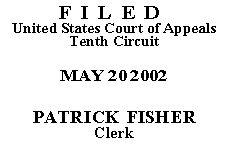

| UNITED STATES OF AMERICA,
Plaintiff - Appellee, v. ANTHONY D. LOCKE, also known as Sealed, Defendant - Appellant. |
|
Anthony Locke, a federal prisoner convicted of several drug-related offenses, seeks a certificate of appealability (COA) to appeal the district court's denial of his habeas corpus petition. To obtain a COA, he must make "a substantial showing of the denial of a constitutional right." See 28 U.S.C. § 2253(c)(2).
Locke presents ten issues, many with multiple subparts. Most allege that his trial and appellate lawyer (they were the same person) were constitutionally ineffective. In light of the governing legal standard, this court has reviewed his request for a COA, his appellate brief, and the district court's order; it has also read the transcript from his trial. Based on that review, and for substantially the reasons stated by the district court in its order of May 25, 2001, we are convinced Locke's habeas petition is not deserving of further proceedings, debatable among jurists of reason, or subject to different resolution on appeal. See Slack v. McDaniel, 529 U.S. 473, 484 (2000). His request for a COA is DENIED. This appeal is accordingly DISMISSED. Locke's request to proceed in forma pauperis is GRANTED.
Entered for the Court
Circuit Judge
*. This order and judgment is not binding precedent, except under the doctrines of law of the case, res judicata, and collateral estoppel. The court generally disfavors the citation of orders and judgments; nevertheless, an order and judgment may be cited under the terms and conditions of 10th Cir. R. 36.3.